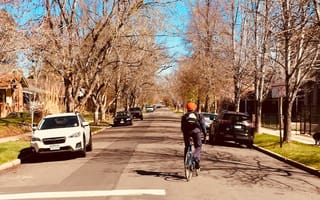
Last week, Denver was named the fourth most bike-friendly city in the country, in a score based on factors like access to bike lanes, bike commuting mode share, road connectivity and hilliness. But despite the accolades, the latest commuter survey shows that only eight percent of the city’s workforce uses a bicycle as a means of commuting to and from work.
So why the disconnect?
According to local tech entrepreneur Avi Stopper, it comes down to comfort.
While Denver indeed has a vast network of bike routes, urban development and increased traffic have caused many of those routes to become congested and less-than-friendly to your average cyclist.
The reality is that the way bike lanes are designed, to me, seems to have a very big disconnect with how people want to ride.”
“The reality is that the way bike lanes are designed, to me, seems to have a very big disconnect with how people want to ride,” Stopper said.
“One study done out of Portland found that two-thirds of people want to ride bikes — not just in Portland, but nationally — but of that two-thirds, 60 percent are what they call ‘interested but concerned.’ Without adequate bike facilities and infrastructure, you’re just not going to get those people on bicycles.”
That’s where Bike Streets comes in.
By mapping local bike routes that cater to those who don’t want to battle narrow bike lanes and fast-moving traffic, and building a community around the normalization of urban biking, Stopper hopes to make Denver the most bike-friendly city in the country.
Every day, Stopper combs over local maps, comparing the current city bike routes with alternate routes in the area — primarily, low-traffic side streets. Then, he sets out on his bike to put those routes to the test, leveraging geographic information system (GIS) technology and a degree in geologic field mapping to build out new routes.
The Bike Streets map is still in development, but Stopper is already actively engaging the community in preparation of its release later this month.
Through the Bike Streets Passport, riders commit to riding their bike eight times in the month of June. Using the Bike Streets map, riders visit participating coffee shops, museums, breweries, bike shops and more for stamps, and in some cases discounts and specials, to be entered to win prizes for riding the most.
Stopper’s end goal is to bring urban biking into the mainstream and prove to people that they don’t need fancy equipment, spandex or even to break a sweat to make biking a regular part of their lives.
All businesses and community organizations are welcome to join as Bike Streets destinations — from tech startups that want to encourage employees to get on their bikes more to local businesses that want to generate more foot traffic.
“The city is looking for ways to get people on bicycles, and the tried-and-true, status quo approach has definitely gotten people out on bikes, but it hasn’t made it a mainstream activity,” he said.
“It’s important to demonstrate this is a normal thing. From technology circles to church groups to immigrant groups, I’m trying to get people of all backgrounds to recognize that this is something they can do.”



